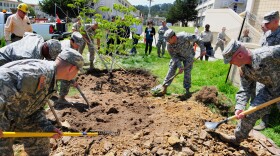Krista Almanzan
Krista joined KAZU in 2007. She is an award winning journalist with more than a decade of broadcast experience. Her stories have won regional Edward R. Murrow Awards and honors from the Northern California Radio and Television News Directors Association. Prior to working at KAZU, Krista reported in Sacramento for Capital Public Radio and at television stations in Iowa. Like KAZU listeners, Krista appreciates the in-depth, long form stories that are unique to public radio. She's pleased to continue that tradition in the Monterey Bay Area.
-
Sgt. Nick Cunningham, a bobsledder, is one of seven U.S. service members competing in Pyeongchang. "They told me, 'Go win medals for this country,'" he says. "And that's my job at this moment."
-
The Pentagon wants to close military bases to save money. Communities like one in Monterey, Calif., are already preparing to be sure they're not on the next closure list.
-
This year the U.S. military spent $1.4 billion to run nearly 240 stores that provide discount groceries to troops. Next year, the Department of Defense wants to cut $200 million from the subsidy.
-
A wildfire along California's Central Coast, south of San Francisco, has destroyed dozens of homes. Hundreds of families have been evacuated. To keep the fire from consuming anymore homes, crews are trying to guide the fire into a national forest.
-
For the past decade, a Veteran Service Office operating inside a prison has aided 1,000 incarcerated veterans in receiving more than $15 million in benefits for themselves and their dependents.
-
Unmanned aerial vehicles can sound like a swarm of bees with a relentless buzzing noise. Now, drones can act like one as dozens are programmed to soar and work together.
-
Along California's central coast, the city of Monterey and the Army's Defense Language Institute have formed a partnership, saving about $2 million a year by sharing costs.
-
A unique group of college students from California's Salinas Valley — many the children of farmworkers and immigrants — is working toward careers in major tech companies.
-
Immigrants from Mexico don't always speak Spanish. Instead they speak indigenous languages. That's created huge communications problems, but a hospital in Salinas has found a solution.
-
In the largely Hispanic Salinas Valley, high school students are more likely to imagine a future in agriculture than high-tech. A new program is trying to change that.






